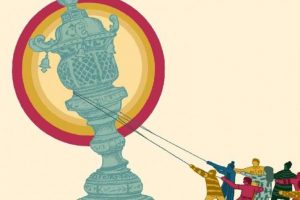
Songkran Waiyaka, a US Army chaplain with the rank of captain, represents a unique bridge between distant cultures. Waiyaka has served for 13 years as one of only 10 Buddhists among more than 3,000 religious leaders in the US Army. Recently, he returned to his home country, Thailand, to participate in joint Thai-US military exercises.
Born and raised in a farming family in Thailand’s northern Chiang Rai Province, Waiyaka was ordained as a samanera (novice monk) in 1985 at the age of 13. In 1991, he was fully ordained at Wat Rajanaddaram in Bangkok, where he would go on to reside for 12 years.

Explaining the rules followed by monastics in Thai Tharavada Buddhism, Waiyaka noted that, as a novice, he followed 10 precepts: “That was until I hit 20 years old; then I had 227 [precepts].” (Stars and Stripes)
After his time in Bangkok, Waiyaka moved to the United States, where he served in a number of Buddhist communities, including Wat Buddhanusorn in Fremont, California, and others in the San Francisco Bay area. While there, he thought deeply about his next steps in life.
“If you keep a Buddhist monk in a monastery, how are they going to spread the Buddha’s teachings to the world?” Waiyaka said. (Army)
“Basically, I just retired,” Waiyaka said of his decision to disrobe at the age of 35. “I wanted to try something different and be able to carry on my experience without changing my identity.” (Army)
After leaving monastic life, Waiyaka went on to study, earning degrees in education and information technology. After that, he joined a training program led by the International Order of Buddhist Ministers, joining the US Army chaplain candidate program in 2011. Finalizing his education, he joined the University of the West’s Master in Divinity in Buddhist Chaplaincy program.

Now, after more than a decade serving in the military, Waiyaka says that it has not been a great struggle.
“My first assignment was at Fort Stewart in Georgia with the 703rd Brigade Support Battalion, and the slogan of my battalion was to ‘maintain the line,’” he said. “I talked to my commander and said, ‘Sir, maintain the line is not enough.’ I wanted to add ‘maintain the mind.’” (Stars and Stripes)
For Waiyaka, the practice of mindfulness is important in all of our daily lives, but it is critical for soldiers. “If the soldier is weak, that’s a no-go,” he said. “If they have a big six pack, big muscles, but their mind is weak, that’s no good.” (Stars and Stripes)
Waiyaka also felt that his service in the military allowed him to interact with and help more people than he could as a monk. “When I joined the Army, I found that I’ve done more than when I was a monk in America for 11 years,” he said. (Stars and Stripes)
Today, Waiyaka serves as the battalion chaplain for the 53rd Transportation Battalion out of Joint Base Lewis-McChord Washington, where he tends to the spiritual and moral needs of soldiers and their families.
While welcoming all faiths and backgrounds, Waiyaka made it clear that in the military, “If you have the wrong mindset, everything is going to go wrong.” (Army)
“I promote people first,” Waiyaka said. “This is what I’m going to do for a living. (Army)
See more
US Army chaplain puts people, service to others first (U.S. Army)
Popping smoke: How a Buddhist monk left Thailand and became a US Army chaplain (Stars and Stripes)
US Army captain defying tradition with a Buddhist twist (The Thaiger)
Related news reports from BDG
Santa Fe County Declares 21 February “Serene Mountain Day at the Upaya Zen Center”
Engaged Buddhism: INEB to Host Three-Day Chaplaincy Workshop for Buddhist Caregivers
Columbia University Hosts Buddhist Chaplaincy Conference in New York
Related features from BDG
At the Heart of Buddhist Chaplaincy
Serving Humanity in Transition: Chinese Buddhism and Spiritual Care in the United States
Buddhist Spiritual Care
Buddhist Ministry Initiative Conference: Building Partnerships and Forging Ties
Buddhist Explorations in Pastoral Care and Contemplative Counseling












